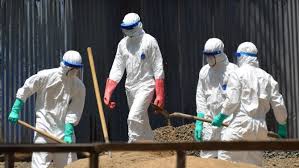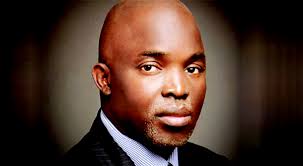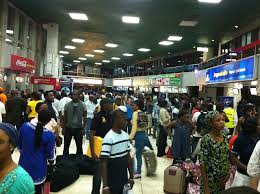African countries on Thursday pledged to send more than 1,000 health workers to Ebola-ravaged Sierra Leone, Guinea and Liberia, where the World Health Organization says the spread of the killer virus “remains of great concern”.
Health workers from the Liberian Red Cross wear protective gear as they shovel sand that will be used to absorb fluids emitted by Ebola patients at the ELWA 2 Ebola management center in Monrovia, October 23, 2014
African Union chief Nkosazana Dlamini-Zuma said the regional bloc was responding to an urgent need for well-trained medical reinforcements to help in the fight against the world’s worst-ever outbreak of the disease.
“Several African member states have pledged to send in a number of health workers to Liberia, Sierra Leone and Guinea, including DR Congo which will send around 1,000 workers in three groups,” Dlamini-Zuma told reporters in Freetown.
East African members of the bloc had earlier pledged to send another 600 health workers, she added.
A lack of skilled medical professionals has been one of the major obstacles in the battle against Ebola, which according to the WHO has now infected nearly 10,000 and claimed the lives of almost 4,900 people in west Africa.
Health workers in particular have paid a heavy price, with 244 deaths out of 443 cases.
The WHO said after an emergency meeting on the deadly haemorrhagic fever that the situation in the worst-hit countries of Guinea, Liberia and Sierra Leone “remains of great concern” as cases increase exponentially.
“It has been terrifically difficult to get enough health workers — both domestic health workers as well as international health workers — and this continues to be one of the major challenges,” said WHO’s deputy chief Keiji Fukuda.
In the face of criticism that the agency was too slow to react to the global emergency — the first case was in Guinea in December — Fukuda said the international community had ramped up its response, with 600 international experts deployed in the region in recent weeks.
And its “70/70” plan aims by December to ensure 70 percent of people infected by Ebola are placed in medical isolation, and, given that dead bodies can spread the virus, to ensure 70 percent of burials are conducted safely.
– ‘Race against time’ –
The European Union meanwhile fast-tracked 24.4 million euros ($31 million) to find vaccines and treatments.
“We’re in a race against time on Ebola,” said EU chief Jose Manuel Barroso.
EU leaders also named Christos Stylianides of Cyprus as the bloc’s new Ebola czar, tasked with coordinating the fight against the disease.
There is currently no licensed cure for Ebola, which is transmitted through close contact with the bodily fluids of an infected person or the body of someone who has died from the disease.
The hunt is on for a vaccine, with supplies of Canadian-discovered experimental vaccine rVSV arriving in Geneva for a new round of trials.
Hopes are also centred on ChAd3, an experimental vaccine made by British company GlaxoSmithKline.
Whichever proves its mettle in trials, WHO hopes to deploy tens of thousands of doses to Africa by early 2015 for “real-world” tests.
WHO held closed-door talks Thursday on the issue of access to and financing vaccines, as officials said costs could be in the “hundreds of millions” of dollars.
– Sierra Leone ‘reacted appropriately’ –
In Sierra Leone, where Ebola has claimed more than 1,200 lives, President Ernest Bai Koroma said he was confident the virus would be contained by the end of 2014.
“I am of the view that by the end of the year, we’ll be in a position of not eliminating but containing the Ebola virus,” he told Britain’s ITV News.
Defending his government’s handling of the epidemic, he said Ebola “was new to all of us” and that his country had followed the advice from the WHO.
“I believe we have been reacting appropriately,” he said.
Besides battling Ebola within their borders, the WHO said exit screening of air, land and sea travellers from affected countries remained critical.
But the agency reiterated its opposition to any general ban on travel or trade with the region, saying it would pile on more economic hardship and raise the risk of “uncontrolled migration of people from affected countries, raising the risk of international spread of Ebola”.
Senegal and Nigeria, which together had a handful of cases, were declared Ebola-free by the WHO on Friday and Monday, respectively, and have won praise for their rapid fightback against the disease.
Liberian President Ellen Johnson Sirleaf on Thursday announced strict new border controls with neighbouring Guinea and Sierra Leone.
International alarm has been stoked by cases beyond Africa.
Spain has seen one non-fatal infection, a nurse who caught Ebola from a patient she cared for — a missionary who died of Ebola after returning from Liberia.
In the United States, two nurses fell ill after caring for a Liberian man who died from the disease on October 8, the first Ebola case to be diagnosed on US soil.














